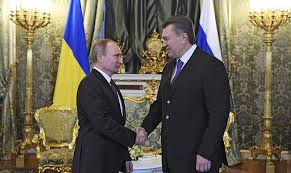Ukraine’s embattled President Viktor Yanukovych returned to protest-hit Kiev on Saturday after holding crisis talks with his Russian counterpart and ally Vladimir Putin about a suspended Moscow bailout loan.
Ukraine's embattled President Viktor Yanukovych returned to protest-hit Kiev on Saturday after holding crisis talks with his Russian counterpart and ally Vladimir Putin about a suspended Moscow bailout loan.
The chat late Friday on the sidelines of the opening ceremony of the Winter Olympic Games in Russia's Black Sea resort of Sochi came amid growing pressure from the opposition on Yanukovych to cede some of his broad powers and appoint a new pro-Western government.
Neither Russian nor Ukrainian officials disclosed the details of the two leaders' conversation except to say that it was brief and held at Sochi's Fisht stadium where the Games' opening ceremony was held.
"They had a conversation at the stadium," a Ukrainian administration spokesman said by telephone.
"There was no official bilateral meeting. That was not a part of (the president's) programme," the spokesman said.
Yanukovych had been expected to discuss with Putin the fate of a $15-billion Russian bailout whose delivery has been effectively frozen pending his decision on a new government.
The ex-Soviet country of 46 million was thrown into its worst crisis since independence in November when Yanukovych ditched an historic EU pact under Russian pressure in a stunning reversal that sparked violent protests that have claimed several lives.
The sustained protests that followed have since then played out as a struggle for the country's future between the West and Russia.
Yanukovych must now decide whether to submit to protesters' demands by taking a more conciliatory approach toward a new agreement with the European Union -- a possibility that prompted Russia to suspend its bailout payments after issuing just one installment of $3 billion in December.
The Ukrainian leader has named his close ally Sergiy Arbuzov as acting prime minister and was expected to try and convince Moscow that the Kiev government was still committed to the terms of Putin's bailout deal.
Ukraine's economy is in urgent need of assistance amid sliding domestic production and dwindling foreign reserves that can barely afford foreign payments of about $10 billion this year.
The protracted crisis has seen Ukraine's borrowing costs spike and the currency lose nearly 10 percent of its value amid a rush by frightened consumers to cut their losses by stocking up on dollars and euros.
Several banks have reported dollar shortages and the central bank on Friday was forced to impose temporary exchange restrictions while moving the currency's official exchange rate to 8.7 from 7.9 hryvnias -- its first shift of the peg since July 2012.
The central bank's new control measures include a $5,500 monthly limit on the amount of foreign currency that can be obtained by individuals.
Companies can buy unrestricted amounts of dollars and euros but have to wait at least six days to receive the foreign currency.